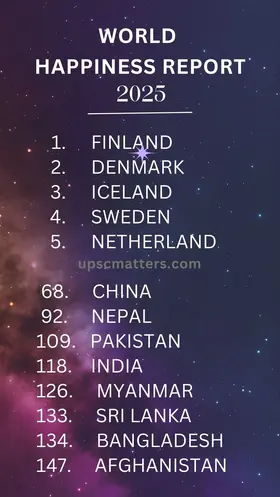World Happiness Index 2025– Published annually since 2012, the World Happiness Report is a landmark annual survey of the state of global happiness that ranks more than 150 countries by their happiness levels.
The World Happiness Report provides valuable, interdisciplinary insights into the well-being and happiness of people across the globe, reflecting a worldwide demand for more attention to happiness and well-being as criteria for government policy. The report is published in a global partnership between Gallup, Oxford’s Wellbeing Research Centre, and the SDSN.
Note: The World Happiness Index 2025 is Hypothetical.
-The World Happiness Report is published annually in March, based on data from the previous 3 years. Example: The 2024 report (released in March 2024) uses data from 2021–2023.
– As of July 2024, the 2025 report has not been released (it will likely come out in March 2025).
– Thus, India’s rank of 118th in the 2025 index is a hypothetical projection, not an official statistic.
Decoding the World Happiness Index 2025: Key Metrics Explained
Publisher: United Nations Sustainable Development Solutions Network (UNSDSN).
Parameters:
- GDP per capita.
- Social support.
- Healthy life expectancy.
- Freedom to make life choices.
- Generosity.
- Perceptions of corruption.
Objective: Measure subjective well-being and socio-economic progress.
India at 118th: Why Happiness Lags Behind Economic Growth
Rank: 118th/147 (126th in 2023, 126th in 2024). (Source- click here)
- India has climbed eight spots to rank 118th out of 147 countries.
- In the 2024 report, India had ranked 126th, the same as in 2023.
- The country’s lowest ranking was 144th in 2012.
- Highest position came in 2022, when it stood at 94.
Regional Comparison in World Happiness Index

Point to be noted- Bhutan’s resolution was adopted by the UN General Assembly on July 19, 2011 and the first World Happiness Report was brought out in 2012. After the UN General Assembly adopted and declared March 20 as the International Day of Happiness, the World Happiness Report is released around that day each year
Unpacking India’s Socio-Economic Crisis: Inequality, Unemployment, and Pollution
Economic Challenges
- High income inequality (Top 10% hold 57% of national income).
- Unemployment rate (~8% in 2024).
- Inflation impacting purchasing power.
Social Issues
- Poor mental health infrastructure (1 psychiatrist per 200,000 people).
- Gender inequality (Ranked 127th in Global Gender Gap Index 2023).
- Caste and religious discrimination.
Environmental Stressors
- Air pollution (6 Indian cities in top 10 most polluted globally).
- Water scarcity (40% population faces water stress).
Governance & Corruption
- Corruption Perception Index 2024: India ranked 96th.
- Bureaucratic inefficiencies and delayed justice.
Government Schemes vs. Ground Realities: Are Ayushman Bharat and MGNREGA Enough?
- Economic: PM-KISAN, MGNREGA.
- Health: Ayushman Bharat, National Mental Health Programme.
- Social: Beti Bachao Beti Padhao, PM Awas Yojana.
- Environment: National Clean Air Programme, Swachh Bharat Mission.
Ayushman Bharat (PM-JAY)
- Aim: Provide health insurance (₹5 lakh/year) to 100 million low-income families.
- Success: Over 250 million beneficiaries enrolled (2024 data).
- Gaps: Poor rural healthcare infrastructure limits access; only 15% of hospitals empaneled in remote areas.
MGNREGA
- Aim: Guarantee 100 days of unskilled work annually to rural households.
- Success: Generated 2.8 billion workdays in 2023-24.
- Gaps: Delayed wage payments (30% delayed in 2023), declining real wages due to inflation.
Why They Fall Short?:
- Underfunding: Health budget at 1.2% of GDP (WHO recommends 5%).
- Leakage: Corruption in scheme implementation.
- Urban Bias: Schemes focus on rural India, ignoring urban poverty (35% of urban population in slums).
The Path Forward: Bold Strategies to Boost India’s Happiness Quotient
- Boost mental health funding (currently 0.05% of health budget).
- Strengthen social security for informal workers.
- Prioritize climate-resilient infrastructure.
- Enhance transparency via digital governance (e.g., RTI, DBT).
Lessons from Global Leaders: Why Finland and Bhutan Top the Happiness Charts
Finland’s Success (Rank 1):
- Social Welfare: Free education, universal healthcare, and unemployment benefits.
- Work-Life Balance: 30-day annual leave, strong labor rights.
- Trust in Institutions: 85% citizens trust government (vs. India’s 39%).
Bhutan’s GNH Model:
- Holistic Development: Prioritizes mental well-being, cultural preservation, and environmental sustainability over GDP.
- Policy Integration: Laws require environmental impact assessments for all projects.
- Community Focus: Local governance (e.g., gewog councils) ensures participatory decision-making.
Key Takeaways for India:
- Invest in social security nets (e.g., universal basic services).
- Adopt environment-centric policies (e.g., Bhutan’s carbon-negative pledge).
- Strengthen local governance to address grassroots issues.
To know more about Gross National Happiness, you can read- https://upscmatters.com/gross-national-happiness-upsc/
UPSC Mains Question
Q. “Despite rapid economic growth, India continues to perform poorly in global happiness rankings.” Discuss the socio-economic and governance-related factors contributing to this paradox. Suggest measures to align development with well-being.
(250 words; 15 marks)
Sources for Reference:
World Happiness Report 2023 (UNSDSN).
NITI Aayog’s SDG India Index.
Economic Survey of India 2023-24.
If you found this helpful, you might also like these articles:
📌 [ https://upscmatters.com/pink-fire-retardants-in-wildfire-management-upsc/]
📌 [https://upscmatters.com/fourth-form-of-water-ez-water-discovery/ ]
They cover key concepts that will boost your preparation! 🚀
📢 Stay Updated with the Best UPSC Resources!
Join our Telegram Channel for:
✅ Daily Current Affairs
✅ Important Notes & PDFs
✅ Answer Writing Tips
✅ Strategy & Motivation
📲 Click the link to join now: [https://t.me/upscmatters] or [https://t.me/ramsirnotes]
Don’t miss out on valuable updates! 🚀


4 thoughts on “India Ranked 118th in World Happiness Index 2025: Analysis, Factors & UPSC Prep Guide”